I am reprinting the entirety of my first and most ambitious book (Moving Places: A Life at the Movies, New York: Harper & Row, 1980) in its second edition (Berkeley: University of California Press, 1995) on this site in eleven installments. This is the tenth.
Note: The book can be purchased on Amazon here, and accessed online in its entirety here. — J.R.
5—
Made in Hoboken
Douglas, Wyoming, 1914—three states away from where our old friend Gordon MacRae is still only a radical freshman or a freethinking sophomore at the University of Indiana—Bo is operating his very first movie theater, at the age of twenty-seven. Think of it: when Jonathan’s the same age, in 1970, he’s working fitfully on his second yet-to-be unpublished novel, completing his first yet-to-be unpublished book as an editor (a collection of film criticism he was commissioned to do), still living on the dregs of Bo’s inheritance, and dividing the first three months of the year among three countries: pursuing a heavy love affair in New York, having his appendix removed in London (and smoking hash with his brother Michael’s friends in a room called the Box), and taking acid all alone one beautiful spring afternoon in Paris, where he moved last fall, acid that suddenly prompts him to buy red paint, a roller, and brushes, and to go to work on his bedroom closets—a conversation with the wood, red saying one thing, grain saying another—and later sends him out the door and up rue Mazarine to the Odéon métro stop, a little after 6:30, to take the Porte de Clignancourt train as far as Châtelet and then the Mairie des Lilas train to République. Read more
My column for the April 2015 issue of Caimán Cuadernos de Cine. Although I didn’t have the space to discuss this, it seems to me in retrospect that Jack Nance, even as a relatively minor character (Pete Martell), is as much the realistic backbone of Twin Peaks as he is the realistic anchor of Eraserhead — and, as such, he stands at the opposite end of the spectrum from such supernatural pasteboard characters as Bob (Frank Silva) and Windom Earle (Kenneth Welsh). — J.R.
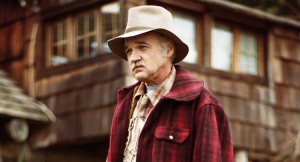
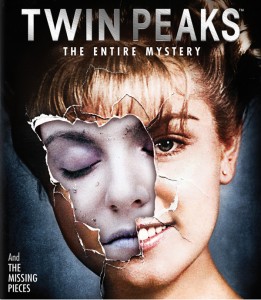
The news that David Lynch and Mark Frost are preparing nine new Twin Peaks episodes — all to be directed by Lynch and set in the present, and to air on cable TV’s Showtime in 2016 — has coincided with the release of a beautifully designed Blu-Ray box set with ten discs, Twin Peaks: The Entire Mystery and The Missing Pieces, devoted to the 29 episodes broadcast in 1990 and 1991 and the subsequent prequel theatrical feature, Twin Peaks: Fire Walk with Me (1992), and many extras. All this has prompted a re-evaluation of the series as a whole, which I’ve now seen in its entirety for the first time. A few critics have aided me in this quest—especially Michel Chion in his 1992 French book on Lynch, Martha P. Read more
This was published at the end of my first year at the Reader, in their Christmas issue. –J.R.
BROADCAST NEWS *** (A must-see)
Directed and written by James L. Brooks
With Holly Hunter, Albert Brooks, William Hurt, Robert Prosky, Lois Chiles, Joan Cusack, and Jack Nicholson.

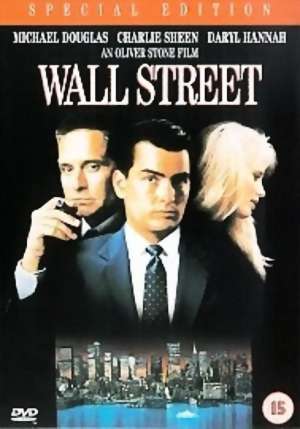
WALL STREET ** (Worth seeing)
Directed by Oliver Stone
Written by Stone and Stanley Weiser
With Charlie Sheen, Michael Douglas, Martin Sheen, Daryl Hannah, Terence Stamp, Hal Holbrook, and Sylvia Miles.
Both Broadcast News and Wall Street score as punchy, energetic movies that are designed to feel as contemporary as possible without taking place in the literal present, and both pivot around a moral reckoning that accompanies economic cutbacks -– as if to remind us that this country’s Reagan-inspired spending spree, which tripled our trillion-dollar national debt, seems to be drawing to a fearful close. Apart from offering behind-the-scenes glimpses of their all-encompassing, hothouse professional turfs, both movies are built around the mise en scene of a moral crisis that splits the major characters apart –- each one charting a mutual seduction that leads to recriminations and the characters isolated in opposing moral camps. Yet the undisputed effectiveness of these films as entertainment seems at least partially predicated on fudging or at least mystifying the moral issues that they are bold enough to raise. Read more
From the Chicago Reader (December 1, 2006). — J.R.
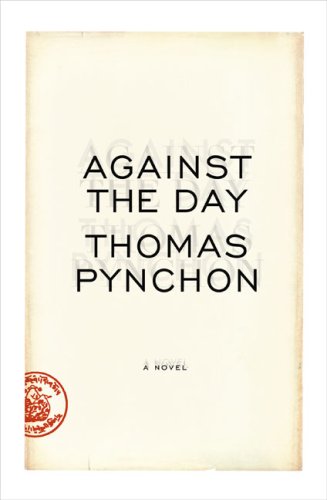
Against the Day | Thomas Pynchon (Penguin Press)
Thomas Pynchon’s 1,085-page Against the Day does a lot of things. Some it does well, some it does badly — and some are impossible to judge this early, though scores of people are trying, in the press and on the Internet. And it may still be beyond the capacity of most of us to judge a year from now. In some respects Pynchon remains as difficult to evaluate as globalization with all its facets and ambiguities.
This passionately anticapitalist book, which most likely took a decade or more to write, follows dozens of characters over more than two decades, starting at the Chicago World’s Fair of 1893 and ending, more or less, in Paris in the early 1920s. Meanwhile it skips across the planet several times, stopping in, among other places, the Balkans, central Asia, Cambridge, Gottingen, London, New York, Paris, Telluride, Venice, and Vienna. Pynchon includes labor history, mathematical equations, ambiguously overlapping stories about alchemy and early photography, and the tale of an anarchist coal miner named Webb Traverse — who specializes in dynamiting railroads and who’s tortured to death by hired guns working for a robber baron — and the lives of his children. Read more
From the Chicago Reader (March 9, 1990). — J.R.
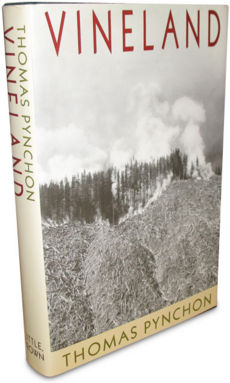
The class which has the means of material production at its disposal, has control at the same time over the means of mental production, so that thereby, generally speaking, the ideas of those who lack the means of mental production are subject to it. . . . The individuals composing the ruling class possess among other things consciousness, and therefore think. Insofar, therefore, as they rule as a class and determine the extent and compass of an epoch, it is self-evident that they do this in its whole range, hence among other things rule also as thinkers, as producers of ideas, and regulate the production and distribution of the ideas of their age: thus their ideas are the ruling ideas of the epoch. –Karl Marx and Friedrich Engels, The German Ideology (1845-46)
A good many newspapers and magazines have accompanied their reviews of Vineland, Thomas Pynchon’s fourth novel, with the same 37-year-old photograph of the author grinning goofily from his high school yearbook. Given Pynchon’s refusal to be photographed or interviewed, there are touches of both desperation and petty vindictiveness in this compulsion to objectify and visualize, however inadequately, a novelist who chooses to be identified only through his writing. Read more






